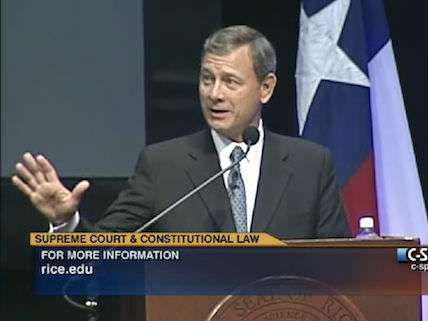Supreme Court Rules for Federal Whistleblower in Homeland Security Case
In 2003 a federal air marshall named Robert J. MacLean alerted a reporter at MSNBC about the Transportation Security Administration's (TSA) cost-cutting decision to remove all air marshals from overnight flights originating in Las Vegas. In MacLean's view, this policy put the public at risk. So he blew the whistle on it. In response to the negative public attention attracted by MacLean's disclosure, the TSA later reversed the policy. A few years after that, MacLean's identity as the whistleblower was discovered and the TSA terminated his employment.
In a 7-2 decision issued today, the U.S. Supreme Court ruled in the whistleblower's favor. At issue in Department of Homeland Security v. MacLean is the section of the 2002 Homeland Security Act which provides whistleblower protections to federal employees who disclose "any violation of any law, rule, or regulation," or "a substantial and specific danger to public health or safety," so long as the disclosure is not "specifically prohibited by law."

Writing for a majority that included Justices Antonin Scalia, Clarence Thomas, Ruth Bader Ginsburg, Stephen Breyer, and Elena Kagan, Chief Justice John Roberts rejected the Obama administration's claim that while MacLean's actions may not have been spelled out in federal law, they were nonetheless fully covered (and therefore forbidden) by TSA rules and regulations. "The question here is whether a disclosure that is specifically prohibited by regulation is also 'specifically prohibited by law,'" Roberts wrote. "The answer is no."
What's more, Roberts explained, under the government's flawed theory of the case, federal agencies could effectively overwrite the specific rules that Congress has placed on them:
[A] broad interpretation of the word "law" could defeat the purpose of the whistleblower statute. If "law" included agency rules and regulations, then an agency could insulate itself from the scope of [the Homeland Security Act] merely by promulgating a regulation that "specifically prohibited" whistleblowing. But Congress passed the whistleblower statute precisely because it did not trust agencies to regulate whistleblowers within their ranks.
Writing in dissent, Justice Sonia Sotomayor, joined by Justice Anthony Kennedy, took the opposite view, claiming that today's decision grants far too much leeway to would-be whistleblowers within the ranks of the federal government. "The Court has left important decisions regarding the disclosure of critical information completely to the whims of individual employees," Sotomayor complained.
The Supreme Court's decision in Department of Homeland Security v. MacLean is available here.
Editor's Note: As of February 29, 2024, commenting privileges on reason.com posts are limited to Reason Plus subscribers. Past commenters are grandfathered in for a temporary period. Subscribe here to preserve your ability to comment. Your Reason Plus subscription also gives you an ad-free version of reason.com, along with full access to the digital edition and archives of Reason magazine. We request that comments be civil and on-topic. We do not moderate or assume any responsibility for comments, which are owned by the readers who post them. Comments do not represent the views of reason.com or Reason Foundation. We reserve the right to delete any comment and ban commenters for any reason at any time. Comments may only be edited within 5 minutes of posting. Report abuses.
Please to post comments


1. Sotomayor blows the positive points she has gained around here.
2. Extremes against the middle. Why moderates are the worst.
Kennedy also blows any positive points for claims that he has a "vague center-right libertarianish view" (claim I've seen elsewhere, mostly not here.)
I hadn't granted him any to begin with.
Shit dude!
Government Bureaucracies were gonna be left at the whim of individuals! WHAT WAS SHE SUPPOSED TO DO !?!??
The question here is whether a disclosure that is specifically prohibited by regulation is also 'specifically prohibited by law,' Roberts wrote. 'The answer is no.'
This would be revolutionary if they were to actually apply it consistently. The regulatory state would be vaporized.
But of course they don't really mean it.
I hope someone will take this precedent and run with it for future cases against the government.
Oh, they will. No doubt about that.
As the decision illustrates, there are lots of laws that clearly state somewhere that rules and regulations under the law are considered as law, or else use the phrase "law, rules, and regulations" or similar. (In fact, this law uses that combined phrase in other places.)
In this particular law, it was noticeable by its absence. The decision isn't saying that rules and regulations never have authority, simply that Congress didn't delegate in this particular narrow case.
"The Court has left important decisions regarding the disclosure of critical information completely to the whims of individual employees," Sotomayor complained."
All whistle blowers are individuals who have taken independent action to disclose "critical information".
Yes, life is going to be so easy for whistleblowers now that they're going to air every piece of dirty laundry in the entire fedgov without fear or repercussion.
If *only* that were true.
So does this mean Edward Snowden is now more likely to be dropped into a windowless, lightless room by the federal government? Or less likely?
I'm pretty sure what he disclosed was prohibited by law-law.
You said law twice.
+1 combustible saddle
I like law.
DHS isn't DoD, and DHS can't actually classify things. They wish they could, but the law doesn't say so.
"Writing for a majority that included Justices Antonin Scalia, Clarence Thomas, Ruth Bader Ginsburg, Stephen Breyer, and Elena Kagan, Chief Justice John Roberts" etc.
Hey, you listed all the majority justices except Alito!
Alito has replaced Thomas as Scalia's shadow.
"The Court has left important decisions regarding the disclosure of critical information completely to the whims of individual employees," Sotomayor complained.
They're all individual government employees.
Kennedy did himself no favor in this decision.